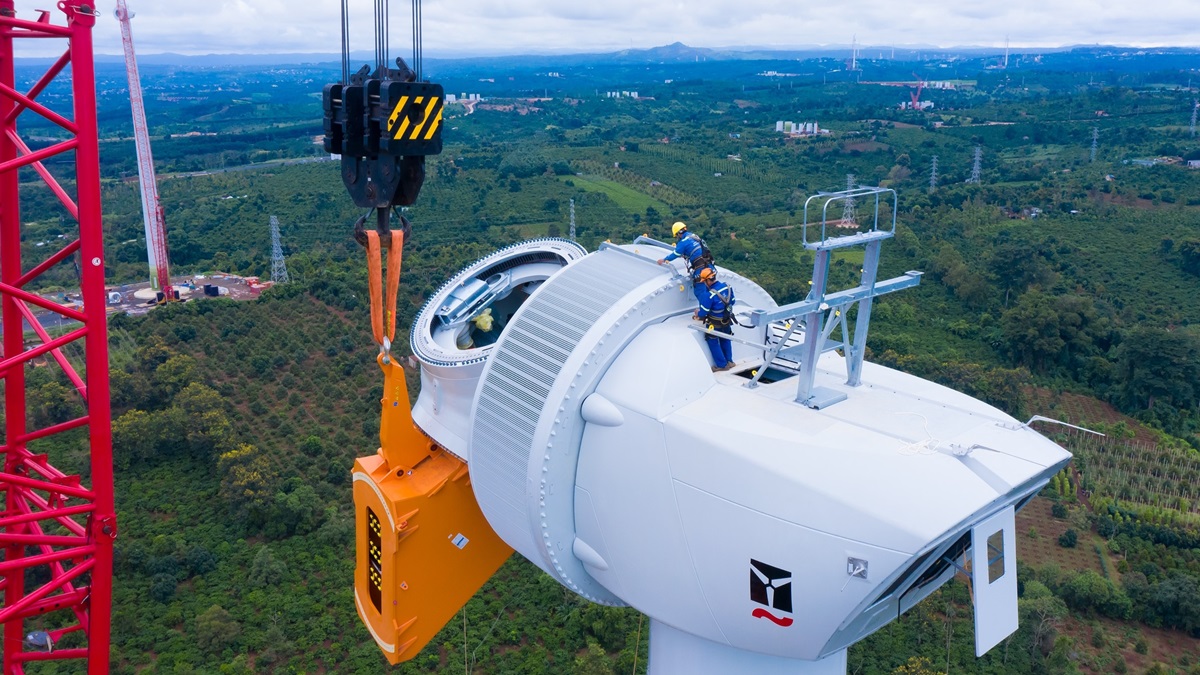The annual conference generates new momentum to combat climate change, but much work remains to help developing economies translate ambition into impactful solutions.
© Shutterstock/thelamephotographer | Workers at a wind turbine construction site.
A $300 billion climate finance target for developing countries by 2035 was agreed, marking an important step towards meeting global needs.
Carbon market frameworks were advanced, laying the groundwork for high-integrity systems.
Trade policies gained formal recognition in climate discussions for the first time, signalling a more integrated approach.
The operationalisation of the Loss and Damage Fund sets the stage for future resource mobilisation.
Adaptation efforts highlight the importance of sustainable, grant-based financing for vulnerable economies.
After extended negotiations, the United Nations climate change conference COP29 concluded in Baku, Azerbaijan, in the early hours of 24 November. While not every agenda item saw full resolution, progress was achieved in several critical areas, paving the way for further advancements at COP30 in Belém, Brazil, in 2025.
So, what are the key takeaways for developing countries, and how can these outcomes be built upon in the coming year?
Climate finance gets a boost but need more ambition
COP29’s headline achievement was the adoption of a $300 billion annual target for developing countries by 2035 under the New Collective Quantified Goal. While this represents a significant step forward, UNCTAD analysis suggests that external financing needs could grow to $1.46 trillion annually by 2030.
To address this gap, the ‘Baku to Belem Roadmap to $1.3 Trillion’ was launched, providing a clear pathway for scaling up ambition in the years ahead. Its success will hinge on translating commitments into action.
Carbon markets: Building credibility and impact
Questions around greenwashing and social impacts have underscored the need to strengthen the credibility of carbon markets, emphasizing the importance of robust and transparent rules. As UNCTAD has emphasized in its latest Least Developed Countries Report, carbon markets, with the right support and design, could positively contribute towards sustainable development.
COP29 saw progress in establishing a global carbon trading system managed by the UN. This framework has the potential to help reduce emissions while contributing to sustainable development, particularly in developing countries.
Further work is required to refine the methodologies and ensure high standards for the credits traded within this system. Progress was also made on decentralised carbon trading rules, but experts have highlighted the need for strong review mechanisms to uphold integrity. Targeted support will be essential to help developing countries fully harness the benefits of these markets.
Trade gets a seat at the climate table
For the first time, COP29 formally recognised the role of trade in climate action by launching a multi-year work plan which includes consideration of the impacts of trade policies. This marks a milestone for integrating economic and environmental agendas.
As emphasised by UNCTAD’s recent work on integrating trade and investment policies into climate plans through the Baku Initiative for Climate Finance, Investment and Trade, policy coherence across climate and economic policymaking is critical.
As this agenda develops, the focus will need to remain on ensuring trade measures support, rather than hinder, development goals.
Adaptation: Strengthening the foundations for resilience
Adaptation remained a priority for many developing countries at COP29, with negotiations advancing the work programme on national adaptation frameworks. A key focus was on ensuring finance is included as an indicator of progress, reflecting the importance of external support for adaptation efforts.
Grant-based financing emerged as a critical component, as highlighted by UNCTAD research. With further discussions scheduled for COP30, the challenge will be turning frameworks into actionable, well-funded initiatives that strengthen resilience.
Loss and Damage Fund operational but need scaling
The operationalisation of the Loss and Damage Fund was a milestone achievement, with disbursements set to begin in 2025. However, current pledges of $700 million fall far below the needs of $150 billion annually estimated by UNCTAD. “This doesn’t come close to righting the wrong inflicted on the vulnerable,” said UN Secretary-General António Guterres.
Moving forward, the focus must shift to mobilising resources and building trust in the fund’s capacity to deliver meaningful support for vulnerable countries. Innovative financing and broader donor participation will be crucial to its long-term success.
Just transition: Focusing on global dimensions
Developing countries stressed the need to address the international aspects of just transitions, ensuring global frameworks align with their development needs. While discussions on the Just Transition Work Programme remain ongoing, they offer a critical opportunity to promote equitable climate action.
Talks are expected to resume in mid-2025 - an important moment to address outstanding issues and build momentum ahead of COP30.
Mitigation: Encouraging early ambition
Discussions on mitigation focused on building momentum following the outcomes of a recent global stocktake of climate progress, which assessed where countries stand in meeting their climate goals. This review is shaping the next round of national climate plans, due by February 2025.
Developing countries emphasized the importance of sufficient financial and technical support to raise their ambition and meet these targets. Encouragingly, some nations have already begun announcing more ambitious plans, creating a positive dynamic for collective progress as the world prepares for COP30.
Building momentum for COP30 in Brazil
COP29 made some important strides in advancing climate action for developing countries, but significant gaps remain. Key issues, such as the scale of financing, the integrity of carbon markets and concrete support for adaptation efforts, require urgent attention and more decisive action.
With Brazil hosting COP30 next year, there is a critical opportunity to translate commitments into impactful solutions. Delivering meaningful progress will be essential to ensuring that developing countries can achieve their climate goals and contribute to global resilience.
As 2025 approaches, the world will be watching to see whether this critical decade for climate action can deliver the results needed to protect the most vulnerable and secure a sustainable future for all.

